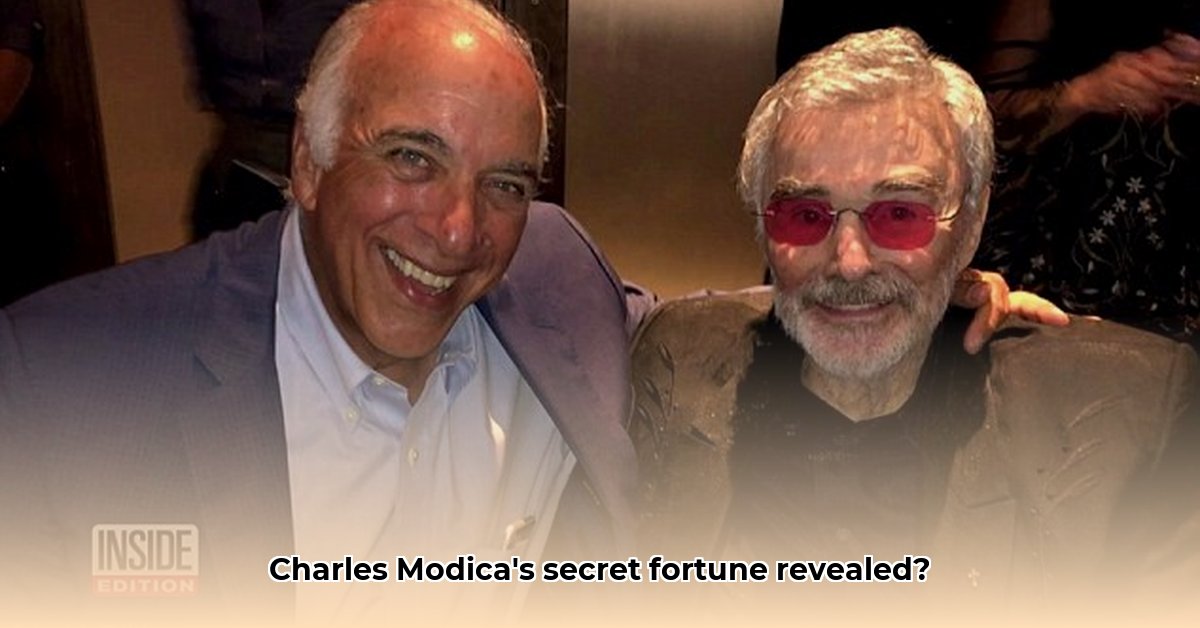
The precise net worth of Charles Modica remains elusive, shrouded in the same ambiguity that surrounds many private individuals of significant wealth. While estimates range from a conservative $50 million to a more ambitious $100 million, the true story transcends mere numerical quantification. It's a narrative interwoven with the life of Hollywood icon Burt Reynolds, underscoring a unique and often overlooked form of celebrity philanthropy.
A Friendship Forged in Quiet Generosity
Burt Reynolds, a legend whose career spanned decades, faced significant financial challenges in his later years. Facing the difficult prospect of selling cherished possessions to make ends meet, Reynolds found unexpected support from his friend, Charles Modica, a successful real estate developer. Modica reportedly purchased Reynolds' luxurious Jupiter, Florida home, allowing Reynolds to remain in residence at a significantly reduced rental rate. This seemingly simple transaction, devoid of public fanfare, offers a compelling case study in unconventional celebrity support.
Was this solely an act of selfless friendship? Or did other, potentially financial motivations underlie the transaction? The absence of public announcements underscores the private nature of Modica's assistance, a stark contrast to the often-trumpeted charitable endeavors of other high-profile figures. This quiet intervention might have averted a far more public and distressing financial crisis for Reynolds, prompting reflection on the countless other untold stories of similar discreet generosity. How often do such quiet acts of kindness go unrecorded, and what impact do they have?
Redefining Philanthropy: Beyond the Public Spotlight
This situation compels a reevaluation of our understanding of 'philanthropy' itself. Modica's actions weren't a grand, publicized donation; rather, they were a subtle, deeply personal act with potentially profound consequences for Reynolds' well-being. This raises crucial questions: How do we effectively measure these quiet acts of generosity? How do we incorporate them into our broader understanding of charitable giving? Our current metrics may seriously underrepresent the true extent of human kindness, overlooking the significant impact of private support. The Modica-Reynolds story highlights the inherent limitations of focusing solely on large, public donations.
The Enigma of Charles Modica's Fortune
The uncertainty surrounding Modica's net worth further complicates the narrative. The lack of transparency around his financial dealings makes it difficult to fully assess the magnitude of his generosity toward Reynolds. What was the precise financial sacrifice involved? We lack the necessary data to provide a definitive answer. Even seemingly straightforward information, such as the exact rental agreement between Modica and Reynolds, remains elusive.
To fully comprehend the significance of Modica's support, further investigation is necessary. A comparative analysis of rental rates for similar properties in Jupiter could help determine the financial value of Modica's gesture. Scrutiny of relevant property tax records could also shed additional light on the transaction. However, accessing such private financial data raises important ethical considerations regarding privacy, necessitating a careful balance between public information and individual rights.
Navigating the Ethical Tightrope: Privacy vs. Public Interest
The ethical implications of reporting on private acts of charity cannot be ignored. Should we publicize such actions without the consent of those involved? Striking a balance between informing the public and respecting individual privacy is crucial. The value of private generosity should not be undermined by intrusive reporting; it’s a delicate dance.
Conclusion: A Story of Unsung Generosity
Ultimately, the story of Charles Modica's net worth is far richer than a simple numerical figure. It's a tale of friendship, financial vulnerability, and the often-unseen acts of kindness that profoundly impact lives. It challenges our conventional notions of wealth and charitable giving, underscoring the need to recognize all forms of generosity, whether public or private. The Modica-Reynolds story serves as a potent reminder that true generosity often flourishes in the quiet corners of life, illuminating the complex interplay between private acts of kindness, public perception, and the inherent challenges of accurately assessing the wealth of private individuals.